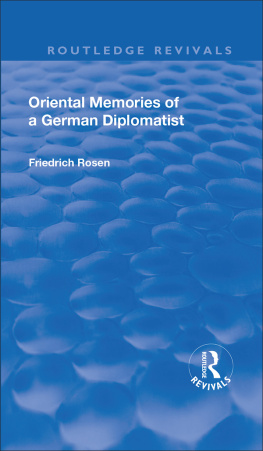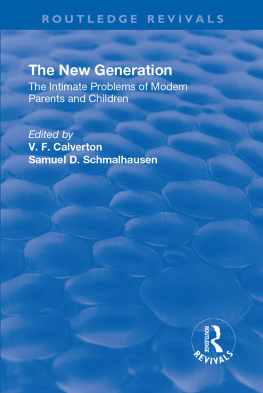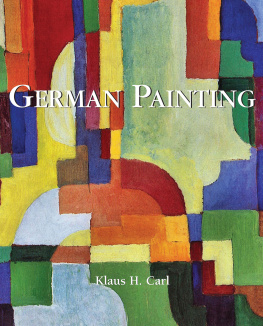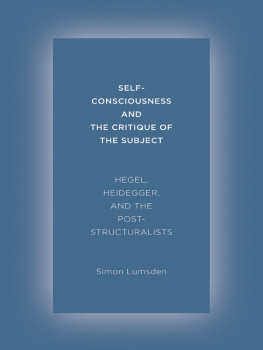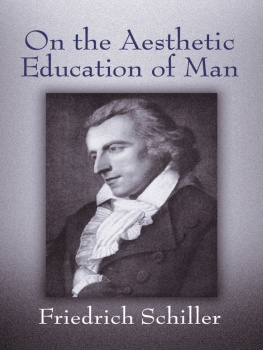Routledge Revivals
ORIENTAL MEMORIES
ORIENTAL MEMORIES
OF A GERMAN DIPLOMATIST
BY
FRIEDRICH ROSEN
First published in 1930 by Methuen & Co. Ltd.
This edition first published in 2018 by Routledge
2 Park Square, Milton Park, Abingdon, Oxon, OX14 4RN and by Routledge
711 Third Avenue, New York, NY 10017
Routledge is an imprint of the Taylor & Francis Group, an informa business
1930 Taylor & Francis.
All rights reserved. No part of this book may be reprinted or reproduced or utilised in any form or by any electronic, mechanical, or other means, now known or hereafter invented, including photocopying and recording, or in any information storage or retrieval system, without permission in writing from the publishers.
Publishers Note
The publisher has gone to great lengths to ensure the quality of this reprint but points out that some imperfections in the original copies may be apparent.
Disclaimer
The publisher has made every effort to trace copyright holders and welcomes correspondence from those they have been unable to contact.
A Library of Congress record exists under ISBN:30031480
ISBN 13: 978-1-138-55075-9 (hbk)
ISBN 13: 978-1-315-12371-4 (ebk)
ORIENTAL MEMORIESBOOKS ON ORIENTAL SUBJECTS
BY THE SAME AUTHOR
SHUMA FARSI HRF MIZNID ? Neupersischer Sprachfhrer.
ELEMENTA PERSICA.
MODERN PERSIAN COLLOQUIAL GRAMMAR.
DIE SINNSPRCHE OMARS DES ZELTMACHERS (German translation from the Persian).
RUBIYT UMAR-I-KHAYYM. Persische Ausgabe.
DER RATGEBER (German translation from the Persian).
SAADIS ROSENGARTEN (Gulistan).
HARUT UND MARUT UND ANDERE DICHTUNGEN AUS DEM ORIENT (German translation from the Persian).
DREI PERSISCHE SCHWNKE VON MIRZA MALKOM KHAN.
INDARSABH DES AMNAT (German translation from the Hindustani).
PERSIEN IN WORT UND BILD.
OMAR KHAYYAMS QUATRAINS (translated into English prose from two newly discovered manuscripts).
THE AUTHOR IN 1905
ORIENTAL MEMORIES OF A GERMAN DIPLOMATIST
BY
FRIEDRICH ROSEN
WITH TWENTY-EIGHT ILLUSTRATIONS
First Published in 1930
PRINTED IN GREAT BRITAIN
TO
MY WIFE
IN this volume I have related some of my experiences in Oriental countries during a period of about forty years ending with the last century. I have not intended to write an autobiography, but have merely tried to give a picture of those countries as I saw them at a time when the influx of European ways and ideas had not yet obliterated much of their original character. A few old sketches which I am fortunate enough to possess, some of them drawn by my mother, will help to illustrate what I remember of Palestine as it was in my younger days.
I have not included in this book my recollections of India, Abyssinia or Morocco, limiting myself to what is generally termed the Near East. I may relate my experiences in India, which were as pleasant as they were instructive, in a future publication.
With regard to the people mentioned in these pages, some of whom have played a prominent part in subsequent political events, I have tried not to let the shadow of a later period fall upon the time I am dealing with in this volume. I speak of them as they appear in my memory and in my letters. If I succeed in giving a true and unbiased picture of bygone years, I hope to have made a step on the road which may in the future lead to the removal of the evil effects of the War and of propaganda which has poisoned the relationship of two nations between whom an armed conflict ought never to have been considered possible.
Fr. R.
BERLIN
March 1930
CONTENTS
LIST OF ILLUSTRATIONS
THE AUTHOR IN 1905
(Photo: Gertrude Bell)
(Photo: Gertrude Bell)
(Photo: Ruth Asch)
ORIENTAL MEMORIESORIENTAL MEMORIES
Part I
Jerusalem
CHAPTER I
EARLY RECOLLECTIONS OF CAMPING AND TOWN LIFEOLD SARACEN HOUSETHE RICH MANS HOME AND ITS INMATESOTHER NEIGHBOURS AND FRIENDSTURKS, ARABS, JEWS AND CHRISTIANSTHE PRINCE OF WALES VISIT TO PALESTINEJERUSALEM AND ITS SURROUNDINGS BEFORE MODERNIZATION
HARRY CRAWFORD was unable to learn any language besides his own, which was English. He was about five years old, and I a little younger. His father, the Reverend Mr. Crawford, was an English missionary. He and his family had pitched their tents alongside ours under the branches of Abrahams Oak, near Hebron. This tree was equally remarkable for its exceptional size as for a tradition according to which Abraham bade the Lord rest Himself in its shade, as the Bible tells us. No one, of course, knew the real age of the tree, but it is certain that as far back as the time of the Crusaders it was looked upon as Abrahams Oak.
Under its widespread branches stood our tents and those of the Crawfords. On all sides were vineyards with ripening grapes. These were guarded by their owners, who had built temporary huts out of unhewn stones; but the grapes were so abundant that we were allowed to pick and eat as many as we liked. In this we were joined by small Arab boys who, clothed only in a shirt, a belt, and a red cap, came to play with us. These urchins, of course, spoke only Arabic, a language which I had learned to speak at the same time as German. My parents preferred my playing with Harry to my seeing too much of my small Arab friends, who had never come into contact with soap. My mother made me understand Harrys lack of adaptability and said I must learn English if I wished to talk to him. This I then did, and soon picked up as much of it as was needed for our juvenile chats and games. I have kept it up ever since, and my mother, who was born and brought up in London, always spoke English to me and to her younger children. Harry Crawfords parents left Palestine soon after we were acquainted, and I have never met my friend again, nor heard of him; but if he is still among the livingand why should he not be?and if this book by chance should fall into his hands, I wish to send him greetings and remind him of our early friendship more than threescore years ago. If I am now able to write these pages in English, as I have been asked to do, I owe this to Harry Crawford, who gave me the first incentive. Of course, I make no pretension to any English literary style; no man can write in another language as in his own. My ambition does not soar beyond the desire to make myself understood.
My father was, at that time, Prussian Consul at Jerusalem. King Frederick William IV of Prussia was much interested in the Holy Land, principally on account of a Protestant Bishopric which had been instituted in Jerusalem by Queen Victoria and himself. He had specially charged my father to look after this Bishopric.
In the summer, when Jerusalem was unhealthy, my parents used to go to some less unpleasant place and spend the hottest time of the year camping. Hebron was their favourite resort. We children liked it on account of its wonderful grapes. We returned there several times. My education, when its time came, was limited to my learning and saying by heart a hymn every morning before breakfast. This I did easily, walking up and down between the vines with my hymnbook for half an hour. After breakfast I was free to roam about the vineyards and watch my friends flinging stones with a sling, just as their forefather David had done, or climbing down a deep well for a drink of cool water, or playing a game of




